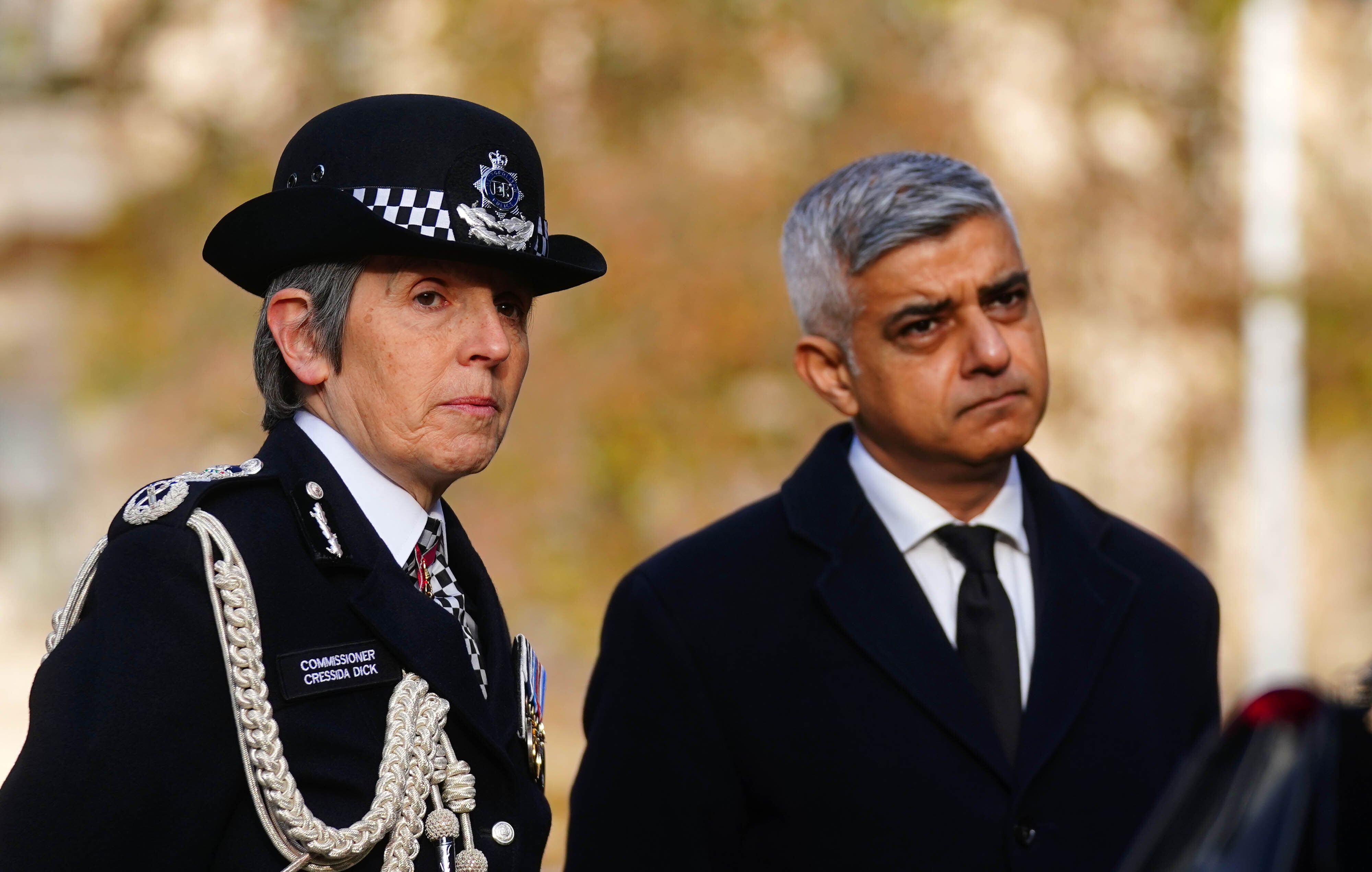
The Home Office was left scrambling to start a recruitment process for a new Metropolitan Police commissioner after Dame Cressida Dick’s resignation.
The Independent understands that the commissioner called Priti Patel personally to inform her of her departure on Thursday afternoon.
Home Office officials were caught off-guard by the U-turn, hours after Dame Cressida told BBC Radio London she had “absolutely no intention” of stepping down.
The commissioner had been due at a regular meeting with the mayor of London, Sadiq Khan, at 4.30pm but did not attend and informed him of her resignation instead.
The decision came after the mayor expressed a lack of confidence in Dame Cressida’s leadership.
Mr Khan had demanded a plan for addressing issues with the Metropolitan Police’s culture and public confidence following a damning report into behaviour at Charing Cross police station last week.
The exposure of officers’ racism and misogyny came after a succession of scandals including the murder of Sarah Everard, which sparked two ongoing inquiries.
The Independent understands that Dame Cressida submitted her response to the mayor on Friday, but he was unhappy with its contents and did not believe the commissioner had grasped the scale of the problems.
In a statement, Dame Cressida said: “Following contact with the mayor of London [on Thursday], it is clear that the mayor no longer has sufficient confidence in my leadership to continue. He has left me no choice but to step aside.”
Home Office sources have expressed dissatisfaction at the way the resignation came about, but a spokesperson for Mr Khan said Thursday’s regular bilateral meeting had been confirmed with Priti Patel’s office.
“Once she decided to resign, it was absolutely right that she was able to inform the home secretary of that herself,” she added.
“As soon as she had spoken to the home secretary, officials spoke and Mr Khan and the home secretary were in touch last night.”

The Home Office has had to rapidly stand up a recruitment process for the next commissioner, which was not expected to take place until Dame Cressida’s contract extension ended in April 2024.
The appointment is expected to take months, rather than weeks, as the post has to be publicly advertised and subject to an open competition.
The Metropolitan Police commissioner is appointed by the home secretary, but she must have ‘“due regard” for the mayor’s views under official processes.
Ms Patel warned that Dame Cressida’’s successor would face “stark challenges” amid a wave of scandals.
Writing in the Evening Standard, she said: “Today, as I prepare to begin the process of choosing her successor, I want to reassure Londoners and people across the country of my commitment to selecting the right leader for the largest police force in the UK.
“Leading the Met is a privilege with enormous and unique responsibilities.”
The home secretary said strong leadership was needed to restore public confidence following a “series of appalling incidents and too many historical cases involving serving Met Police officers”.
“The public in London and across the entire country must once again have confidence in the integrity and professionalism of the police officers who serve them,” she added.
“Policing culture and conduct have rightly come under scrutiny. Be in no doubt that a new leader must tackle these institutional issues.
“I will appoint a commissioner who will deliver results for the public that our police serve and represent.”
Dame Cressida said she would be staying on for a “short period to ensure the stability of the Met and its leadership while arrangements are made for a transition to a new commissioner”.
Her successor will arrive during an internal inquiry into the force’s “standards and culture”, a separate public inquiry sparked by Sarah Everard’s murder, a probe into abuses by undercover police and several criminal cases involving officers.
Scotland Yard is also contesting a legal challenge over its initial refusal to investigate Downing Street parties.
The Good Law Project campaign group said its findings so far were “profoundly troubling” and accused the force of being affected by the high-profile nature of suspects.
In its response, the Metropolitan Police said the initial decision was “not irrational or perverse”, and that it had acted in accordance with an unpublished policy on retrospective Covid investigation.
The force’s lawyers argue that as an investigation is now underway, the matter is “largely academic” and should not be put to a judicial review.







